25+ VoIP Statistics 2024 By Market Share, Growth, Adaptation and Trends
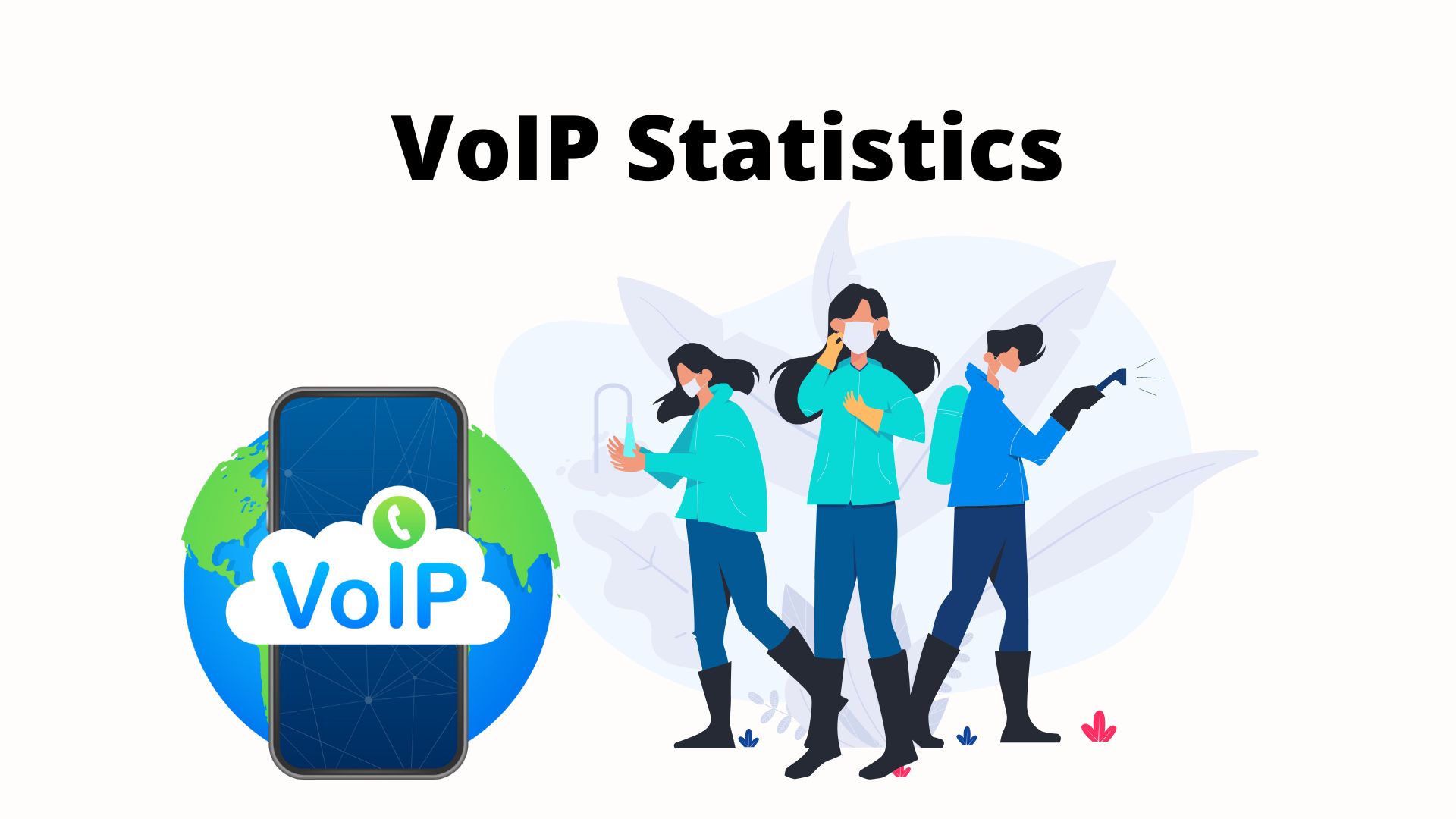
Page Contents
VoIP statistics: In the swiftly evolving landscape of communication technology, Voice over Internet Protocol (VoIP) has emerged as a pivotal force. The “VoIP Statistics 2024” report aims to shed light on the significant trends, market values, and consumer behaviors shaping this dynamic sector. As of 2024, VoIP has not only transformed how businesses and individuals communicate but also offered substantial cost savings and efficiency improvements.
This report, prepared from a market research analyst's perspective, provides an easy-to-understand overview of key statistics and forecasts, highlighting the technology's growing influence in the global market. It serves as an essential guide for understanding the current state and future potential of VoIP services.
Editor’s Choice
- Businesses can save up to 90% on international call costs using VoIP (Internet calling) services.
- The global market value of VoIP is expected to reach USD 102.5 billion by 2026.
- In 2022, the VoIP market in the US was valued at about $17 billion.
- The United States VoIP market is valued at USD 59.5 billion, while the market in China is expected to flourish significantly, with a CAGR of 21.1%, reaching USD 157 billion by 2030.
- Approximately 204.8 billion corporate VoIP subscribers are projected worldwide.
- Mobile VoIP's worth is predicted to be USD 145.76 billion in two years.
- 74% of businesses using VoIP systems employ mobile phones for calls. Businesses can reduce telecommunication costs by up to 50% by switching to VoIP, and for international calls, the savings can be as high as 90%.
- Small businesses can save an average of 32 minutes per day with VoIP. Unified communications can save 191 hours per day for an organization with 100 employees, enhancing overall productivity.
- About 82% of companies reported saving money after switching to Cloud Communication.
- North America holds nearly 40% of the global VoIP market.
- Around 86% of customers expect seamless shift of calls between channels, indicating the growing importance of omnichannel communication facilitated by VoIP.
- Customers typically save about 50% on communication costs with VoIP.
- The costs of VoIP are expected to rise by only 3% by 2024.
- Almost 3 billion people have used mobile VoIP.
- By 2024, Android OS is anticipated to dominate the mobile VoIP market, generating over USD 90 billion.
- 94% of businesses reported enhanced security after switching to cloud-based systems, which often includes VoIP services.
- With the rise of remote work, technologies like VoIP are becoming increasingly important. Remote employees often work more hours than on-site workers, and VoIP aids in managing this workforce effectively.
- Future trends in the VoIP industry may include AI integration for improved call routing, enhanced security measures, and expansion to accommodate technologies like 5G networks and IoT devices.
- The US leads in VoIP usage, with significant numbers in Japan and France. Interestingly, 60% of smartphone users use Google to find and call business numbers directly, often using VoIP services.
You May Also Like To Read
- SaaS Statistics
- Robotics Industry Statistics
- Virtual Assistant Statistics
- Mobile Commerce Statistics
- Metaverse Statistics
- Supercomputer Statistics
- Internet Statistics
VoIP Market Growth and Adaptation Statistics
#1. The VoIP services market will be worth USD 194.5 billion by end of 2024
As per a study, the growth of VoIP relies on low maintenance needs and reduced set-up costs. Many firms are opting for the VoIP landscape to have access to services that offer simplified migration.
#2. The hosted PBX market was valued around USD 9.5 billion in 2023
The usage of hosted PBX services as well is predicted to rise majorly along with the VoIP market. The growth of the PBX market reflects a CAGR increase of 14.9 percent.
#3. North America accounts for 40% of the VoIP market share
The international VoIP calls market is expected to acquire 50 percent of the market share by 2025. While fixed VoIP is expected to have 55 percent of the market share.
#4. The worldwide VoIP market size is predicted to increase to USD 102.5 billion by 2026
The global market size for Voice over Internet Protocol (VoIP) services is expected to grow significantly, reaching an estimated value of USD 102.5 billion by the year 2026. This growth represents a Compound Annual Growth Rate (CAGR) of 3.8%.
Essentially, this means that the market for VoIP services is projected to expand steadily over the next few years, at an average growth rate of 3.8% each year, leading to a substantial increase in its overall value.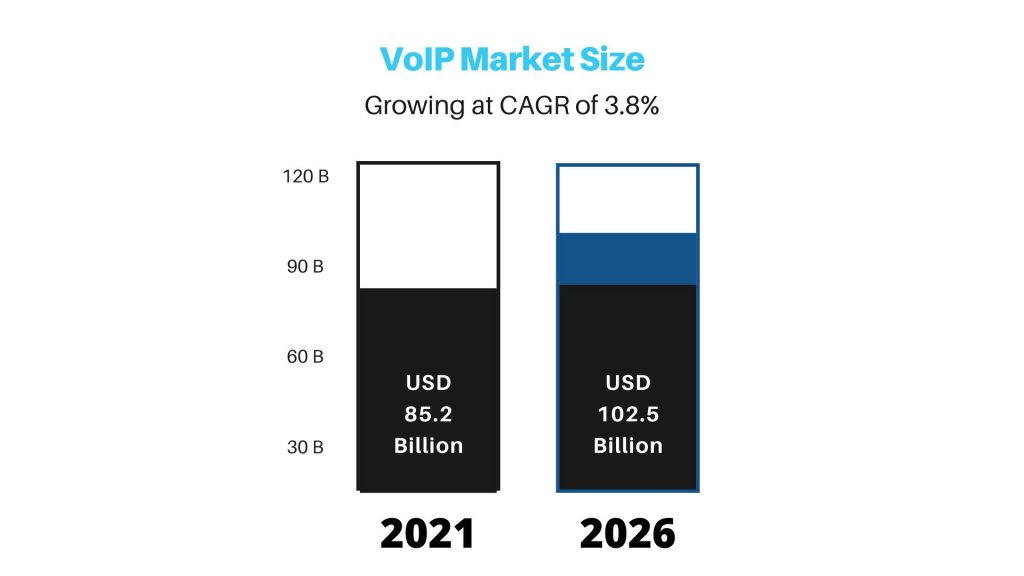
#5. The value of the mobile VoIP market is expected to reach USD 145.76 billion in 2024
If the worth of the mobile VoIP market grows to $145.76 billion, it will reflect a CAGR growth of 20 percent from 2016 to 2024.
#6. After the US, Japan and France have the highest VoIP market shares
Japan and France have 28 million and 21 million VoIP users respectively. However, countries in the Asia Pacific region and India as well are going to have a major VoIP user base.
#7. Nearly 60% of smartphone users access Google to look for a business number and dial it directly
If smartphone users have the access to VoIP service, they can straight away dial the business directory; they do not need any other services.
#8. Android OS is expected to dominate the VoIP market
If the adaptation of VoIP continues to grow at a similar pace, it is predicted that it will generate more than $90
billion in revenue in the upcoming four years.
#9. Businesses can save 75% of funds on communication costs with VoIP services
Installing a VoIP system can result in massive savings, which is why many firms are eager to adopt this tool.
#10. VoIP and Cloud Communication have increased by 24.9% in 2020
There has been rapid growth in all types of unified communication and collaboration tools during the pandemic. The revenue of the VoIP industry as well has increased by 24.9% in the same period.
#11. 82% of firms have recorded cost savings after implementing cloud communication
A report by Microsoft has shown that 82% of businesses have recorded cost savings after moving to cloud communication.
#12. 94% of small trades have said to have better security outcomes by shifting to cloud communication
Nearly 59% of small firms have said that they have gained productivity benefits by implementing cloud communication.
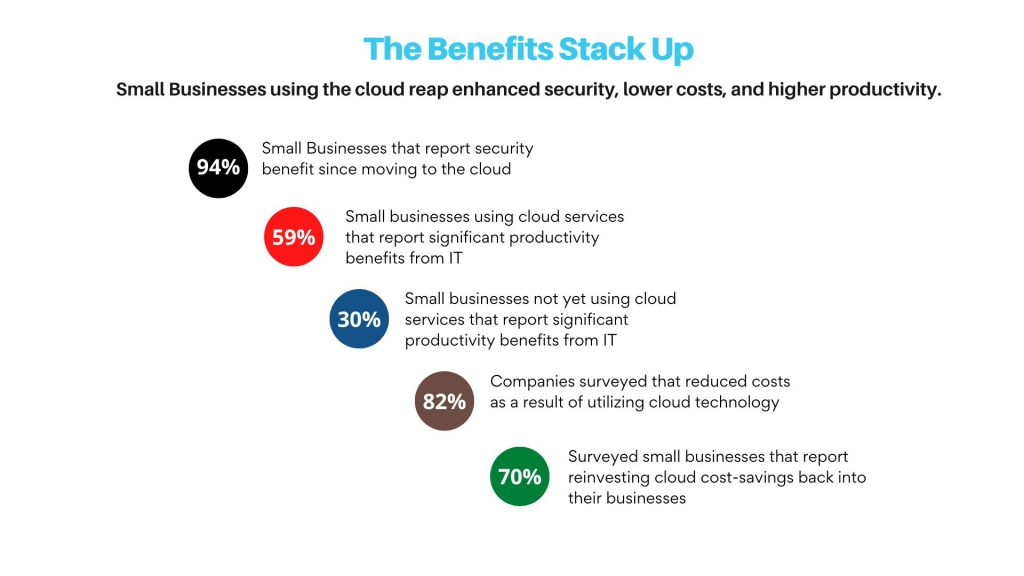 #13. The telecom cloud market is rising at a CAGR of 19.9%
#13. The telecom cloud market is rising at a CAGR of 19.9%
The telecom cloud market was estimated to be worth USD 25.33 billion in 2020. However, it is expected to touch $74.36 billion by 2026.
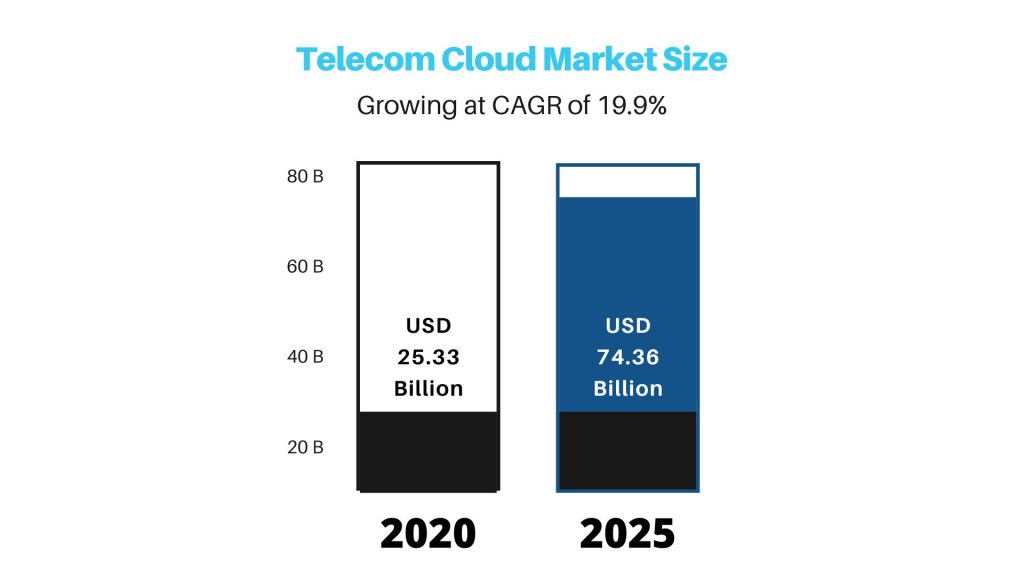
(Source: Findstrack.com)
#14. Around 1 out of 3 employees are appointed at remote companies
As per a survey, nearly 30% of respondents are employed at remote companies. 15% of respondents have said that they are working for firms that allow them to work from home as required. 43% of respondents have said that part of their work is full-time remote.
#15. Nearly 67% of staff say it is more convenient to handle phone calls with VoIP systems
Most employees find it better to use VoIP systems while handling phone calls at the workplace. Around 63% of people have said that there has been an improvement in messages as well.
VoIP Trends and Benefits Statistics
#16. Small businesses can save 32 minutes on average per day on calls with the usage of VoIP services
While firms opt for VoIP for cost savings, they can also accumulate 32 minutes per day on calls on average.
#17. Costs of VoIP services are predicted to go up by only 3% by 2024
A report says that the odds of an increase in the cost of VoIP services are very low. It is estimated to grow by only 3% in the forthcoming two years.
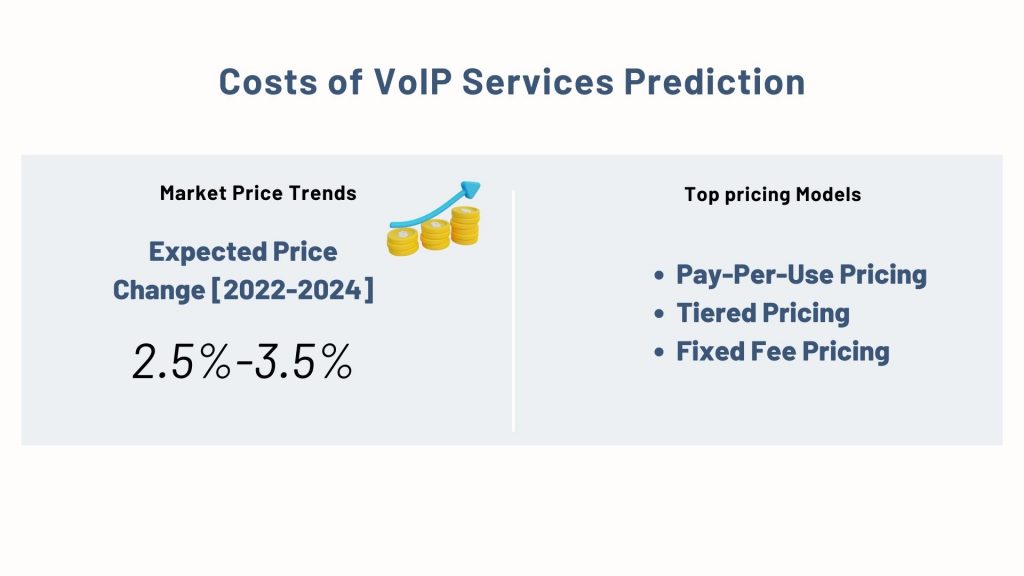
(Source: Findstrack.com)
#18. Small firms can save more than 90% on all communication costs
An analysis of many studies has shown that small businesses can have more than 90% savings on international calls and other communication expenditures by installing VoIP systems.
#19. Nearly 86% of consumers anticipate calls to move seamlessly between channels
VoIP and cloud tools have the ability to offer an improved customer service experience. VoIP is vital for all kinds of omnichannel communications.
#20. Meetings and videos have become integral elements of VoIP services
Using VoIP, firms can transfer other types of content on the internet such as video content.
#21. Around 87% of people are using mobile phones at the workplace for communication
As more and more employees depend on smartphones to be in touch with consumers and other staff members, the rise of VoIP usage in smartphones is inevitable.
#22. Artificial intelligence will be involved in around 95% of customer interactions by 2025
As per VoIP statistics, artificial intelligence (AI) will manage around 95% of customer communication by 2025. Businesses need to be prepared for the emergence of AI in VoIP and other unified communication tools.
#23. Nearly 85% of Fortune 500 Companies use AI to secure their VoIP lines
These prominent companies are using anti-fraud AI tools to provide a safer environment for their users.
#24. The market size for UCaaS is set to reach USD 69.93 billion in the next six years
VoIP is among those powerful advanced technologies that are playing a major role in the rise of Unified Communication as a Service (UCaaS).
#25. 61% of trades have stopped their typical phone lines
According to a survey, around 61% of surveyed CEOs have opted for VoIP services and have stopped their typical phone connections.
VoIP Facts
- VoIP Lines Growth: U.S. business VoIP lines increased from 6.2 million to 41.6 million from 2010 to 2018.
- SMB VoIP Adoption: Small to midsize business VoIP market expected to grow by 15% by 2025.
- Data Efficiency: VoIP utilizes silence suppression to save bandwidth during calls.
- Pandemic Growth: VoIP and video conferencing usage surged by over 200% since 2020.
- VoIP in Scams: Approximately 46% of illegal calls are made using VoIP technology.
- Average VoIP Cost: Typical cost ranges from $20 to $30 per user per month.
- Business Savings: Businesses report 30% to 50% savings after switching to VoIP.
- Price Decline: VoIP costs expected to decline by 3% to 5% annually.
- Time Savings: VoIP systems save an average of 32 call minutes per employee daily.
- North American Market Share: Projected to hold 40% of the global VoIP market by 2025.
- VoIP Business Usage: About 31% of businesses utilize VoIP systems.
- Market Valuation Projection: Global VoIP market anticipated to reach $55 billion by 2025.
- Voice Recognition Market: AI in voice recognition software expected to grow to over $50 billion by 2030.
- Landline Decline: 60% of U.S. adults lived without a landline in 2019.
Conclusion
VoIP statistics mentioned here show that it is time for businesses to make a shift from traditional phone calls to VoIP calls. VoIP has become an essential component of modern-day communication requirements. Business leaders can have actual measurable benefits from installing VoIP systems in their businesses.
FAQ.
VoIP also known as Voice over Internet Protocol is a system or a tool that enables devices that are connected to the internet to make or receive phone calls using internet access.
Cloud is software that can be installed in a server placed anywhere in the world and that can be accessed by users from anywhere in the world through the internet.
The quality of VoIP calls is either better or equal to typical phone calls. However, users' internet connectivity plays a vital role in the quality of VoIP calls.
Users can use their computers and VoIP phones simultaneously.
VoIP cannot function without access to the internet.

Barry is a lover of everything technology. Figuring out how the software works and creating content to shed more light on the value it offers users is his favorite pastime. When not evaluating apps or programs, he's busy trying out new healthy recipes, doing yoga, meditating, or taking nature walks with his little one.